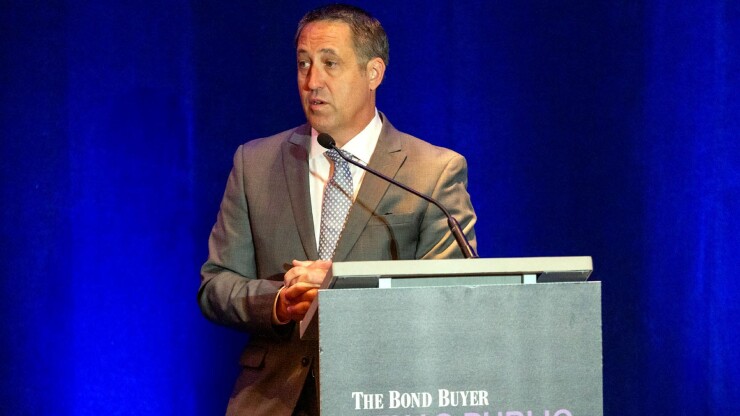
Uncertainty is clouding the future of the municipal bond market and issuers in Texas are bracing for potential federal government moves on the municipal tax exemption, tariffs, and funding, as well as the outcome of the state legislative session, which could include constraints on debt issuance.
Speakers at The Bond Buyer Texas Public Finance Conference in Austin last week pointed to an abundance of unknowns against the backdrop of extreme volatility in the muni market fueled by the Trump administration's
"I do caution the legislature to be mindful of the uncertainty, to be mindful of leaving revenues still in the bank for that uncertain time ahead because there can be a major event nationally and globally," Texas Comptroller Glenn Hegar, a keynote speaker, said.
As for the tariff situation, Hegar, who is
"The number one port of entry for volume of trade is just out here in Laredo, the busiest navigable waterway port is down in Houston," he said. "We have all these ports of entry that are extremely important to the state of Texas, and we are cautiously watching what the policy is."
In 2024, Texas was the largest state exporter, sending $455 billion of goods to other countries, with Mexico, its biggest trading partner, receiving 27% of the exports, according to the
The municipal bond tax exemption
Rob Dailey, PNC's public finance head, said while Washington politicians may view tax exemption as "this big piggy bank of money sitting there that they can possibly tap into," making all bonds taxable, which he doesn't believe will happen, would particularly hit small muni issuers.
"The smaller issuer is probably going to get hurt more than the bigger issuer because yes, it opens up a possibility of so many more buyers potentially, while making the market global to foreign buyers," he said. "But on the other hand, do they want ….a $3 (million) or $5 million issue from some small town somewhere in the United States? Probably not."
Emily Brock, director of the Government Finance Officers Association's Federal Liaison Center, urged issuers to educate their federal representatives.
"The projects need to be articulated to them that will have a much more difficult time, become much more expensive in their districts," she said. "Those are the most compelling stories that help for them to understand elimination (of tax exemption) or taking a scalpel approach."
Potential loss of federal funding is also a concern as initiatives of Elon Musk's DOGE spread through the federal government. The Federal Emergency Management Agency's termination of the Building Resilient Infrastructure and Communities Program this month
"We are having to navigate this landscape where we had a commitment, we have plans for that commitment, and then there was a complete cut to that grant," Austin Mayor Pro Tem Vanessa Fuentes said.
Texas' capital city is projecting a $33.4 million general fund deficit for fiscal 2026.
On the state level, the Republican-controlled legislature has been heeding Gov. Greg Abbott's call to impose supermajority requirements
Conference speakers said such moves would make it extremely hard to pass propositions, while causing a pile up of ballot measures and boosting borrowing costs if successful issuers run to the market at the same time. Municipal bond issuance in Texas
While several bills have been introduced, much of the focus is
Clayton Holland, a partner at law firm Hunton Andrews Kurth, said the high-priority bill could pass in some iteration given lawmakers' determination to close perceived loopholes.
"There has been an openness to input and revision," he said, adding that the case must be made "on how the system is set up and what those provisions do."
The ongoing effort to restrict borrowing is a concern, according to Carmen Arrieta-Candelaria, Fort Worth Independent School District's chief financial officer.
'"We do have critical needs that we need to address, and we want safe roads, we want safe schools, we want safe places for us to get together as communities," she said. "And so I think that the best way to do that is to fund those things through the lowest cost of borrowing."
A top priority for Abbott this year is the passage of an education savings account or
The enactment of vouchers would exacerbate Pflugerville ISD's funding struggles, according to Jennifer Land, the district's CFO.
"The whole ESA conversation really jeopardizes the long-term sustainability of our public schools, and we are looking at what we can try to do long term to remain relevant and make sure that we are educating the kids who we have and the kids who will hopefully see fit to come back to Pflugerville ISD," she said.
The House and Senate passed their versions of a two-year budget that include $1 billion for vouchers and increased funding for public schools.
Earlier this year, Moody's Ratings and S&P Global Ratings reported
Moody's analyst Grayson Nichols told the conference that 30 of the 52 school property tax hike propositions on Texas ballots in November failed.
"It just highlights how much budgetary problems school districts are facing right now," he said. "But again, just because something has failed doesn't necessarily mean an immediate credit impact."
Other bills
Jenny Kerzman, Dallas' assistant director of treasury, said the city moves money around in different investment pools as it seeks to boost interest earnings.
"It will be very hard for us to put all of the money in the same house," she said. "It's just not a good option for us."
With Texas coffers overflowing with cash, lawmakers
In January,
Sales tax collections, the biggest tax revenue source for the Texas general fund budget,